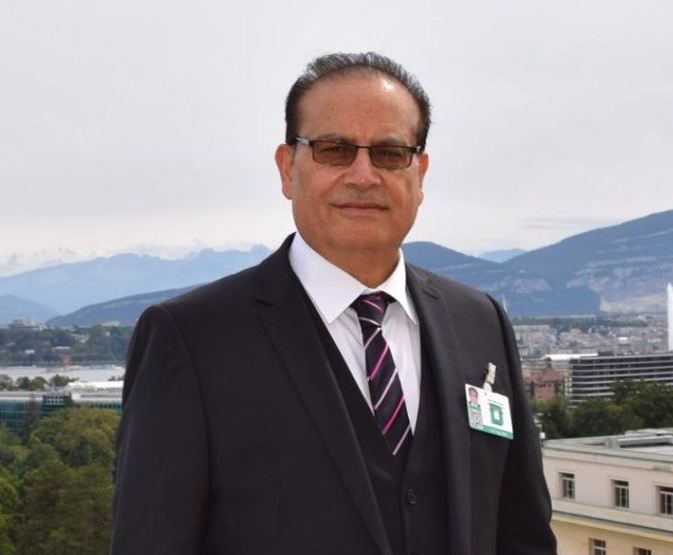By: Qamar Bashir
Two major headlines shook the U.S. and the world. First, President Trump’s defiant tweet: “One who saves his country does not violate any laws.” Second, Vice President JD Vance’s blistering rebuke of European leaders, accusing them—without exception—of betraying democratic values and suppressing free speech. Both statements sent shockwaves, exposing the widening chasm between political rhetoric and the reality of governance in the West.
Trump’s statement invited a flood of criticism across both traditional and social media. Many social media users harshly criticized him, branding him a dictator and authoritarian, and even comparing him to Mussolini, Hitler, and Napoleon. However, such comparisons overlook key historical facts. While Mussolini and Hitler rose to power through a mix of political maneuvering and suppression of opposition, and Napoleon seized power in a coup in 1799 and later declared himself Emperor, Trump was elected through a transparent, free, and fair democratic process.
The president’s statement carries multiple connotations. One interpretation is that the U.S. media, having been challenged by Trump and his team, reacted with hostility after losing the unchecked power to dictate narratives and control political agendas. Unlike past leaders who sought media appeasement, Trump confronted it head-on, refusing to be blackmailed or intimidated. The media’s backlash can be seen as a defeatist response—an attempt to spin his words by stripping them of context to fit their own agenda.
Secondly, democracy in both the USA and Europe appears to have come full circle. Over prolonged democratic rule, the bureaucracy—both military and civilian, judiciary, and media—oiled by filthy rich multinational corporations, has been buying lawmakers to enact scores of laws, rules, and regulations that serve their vested interests, further augment their wealth, protect their privileges, and secure their hefty perks and perquisites.
Over the years, elements of this dirty nexus have amassed such overwhelming influence and have occupied so much space in governance that little remains for democratically elected representatives. This alliance ensures that any political challenge is swiftly neutralized before it crosses acceptable limits. Together, they have transformed democracy into a modern, unelected dictatorship.
The elected leadership, soon after assuming power, finds themselves powerless. Instead of enacting meaningful reforms, they are reduced to a mere figurehead—a toothless showpiece—who spends their tenure justifying the failures of the bureaucracy and defending crimes committed by the unelected elites.
When they try to resist, the faceless dictatorship often coerces them into committing transgressions themselves. Once compromised, the de facto dictators tighten their grip, stripping the politician of power, humiliating them, and ensuring their downfall while keeping their power intact, securing their privileges, and perpetuating the flow of dirty money into their coffers while, in their private conversations, relishing their vanquishing of the political elites.
This faceless dictatorship has reduced ordinary citizens to mere laborers, maybe a little over slaves, who toil day in and day out, barely earning enough to sustain themselves or provide food at their tables. Conversely, the elements of the faceless dictatorship enjoy a lifestyle akin to royalty, lavishing millions on individual events, acquiring airplanes, helicopters, private islands, and expansive estates that were previously exclusive to monarchs.
This form of dictatorship, widespread in both the USA and Europe, might have gone unnoticed had it not been for the rapid rise of nations once dismissed as inferior—those ruled by monarchies, like in the Middle East, or quasi-democracies such as South Korea, Singapore, Thailand, Hong Kong, and Malaysia, as well as socialist China.
These countries, once seen as struggling under supposedly flawed systems, have now surged ahead, surpassing the USA and Europe in nearly every major national and international domain. When the Western powers finally woke up to this reality, they were stunned to find that China, Middle Eastern states, and other quasi-authoritarian regimes had quietly bought up their assets and outpaced them in industries and sectors that were once considered exclusive Western monopolies.
Panic-stricken, the USA and Europe responded with extreme protectionist measures—passing emergency laws to block foreign acquisitions of their assets, shutting their economies off from outside influence, and building legislative fortresses around their institutions. Desperate, they banned foreign media outlets, enacted sweeping laws against “hate speech” and “fake news,” empowered law enforcement agencies to profile their own citizens, clamped down on diversity, pushed aggressive anti-immigration policies, and, in a complete reversal of their long-preached values, embraced white supremacy under the guise of “protecting their cultural identity.”
Ironically, these are the same nations that once used their economic and military might—alongside their control of international institutions—to force other countries into opening their economies, respecting free speech, upholding judicial independence, making immigration-compliant laws, preaching diversity, and selling off their national assets to foreign investors.
Yet, with stunning hypocrisy, while utterly ignoring the suffocating grip of faceless dictatorships on Americans, U.S. Vice President JD Vance took the stage at the Munich Security Conference on February 14, 2025, to deliver a scathing critique of European leaders. He accused them of stifling free speech and religious liberties under the convenient banner of combating “misinformation.”
His remarks, dripping with condescension, painted European leaders as hypocrites masquerading as champions of democracy while, in his view, systematically silencing dissent and eroding fundamental freedoms. Vance’s address, far from a diplomatic overture, landed as a direct insult to Europe’s leadership, branding them as elitist, oppressive, and hopelessly out of touch with the democratic ideals they claim to uphold.
Though delayed, this realization exposes the deep fault lines within democratic systems. The unelected, faceless dictatorship that has engulfed both the USA and Europe has tightened its grip over time, leaving ordinary people struggling and disillusioned. Meanwhile, socialist regimes, monarchies, and quasi-dictatorships have uncovered a simple but powerful truth—empower the people, improve their quality of life, and, in turn, secure long-term stability and influence. By doing so, they are not only consolidating their hold at home but also positioning themselves to dominate regions where governments have failed to uplift their own citizens, leaving them weak and resentful.
The political leaders, both in Europe and the USA, are struggling to reclaim their space from the elements of faceless dictatorship, but it is a long-haul war, not just a battle.
By: Qamar Bashir
Press Secretary to the President (Rtd)
Former Press Minister at Embassy of Pakistan to France
Former MD, SRBC
Macomb, Detroit, Michigan












